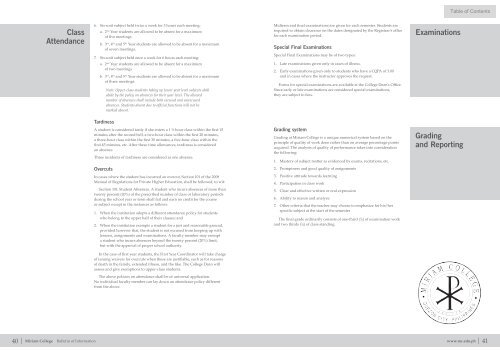MCBOI_2011-2012
MCBOI_2011-2012
MCBOI_2011-2012
You also want an ePaper? Increase the reach of your titles
YUMPU automatically turns print PDFs into web optimized ePapers that Google loves.
Class<br />
Attendance<br />
6. Six-unit subject held twice a week for 3 hours each meeting:<br />
a. 2 nd Year students are allowed to be absent for a maximum<br />
of five meetings<br />
b. 3 rd , 4 th and 5 th Year students are allowed to be absent for a maximum<br />
of seven meetings.<br />
7. Six-unit subject held once a week for 6 hours each meeting:<br />
a. 2 nd Year students are allowed to be absent for a maximum<br />
of two meetings<br />
b. 3 rd , 4 th and 5 th Year students are allowed to be absent for a maximum<br />
of three meetings.<br />
Note: Upper-class students taking up lower year level subjects shall<br />
abide by the policy on absences for their year level. The allowed<br />
number of absences shall include both excused and unexcused<br />
absences. Students absent due to official functions will not be<br />
marked absent.<br />
Midterm and final examinations are given for each semester. Students are<br />
required to obtain clearance on the dates designated by the Registrar’s office<br />
for each examination period.<br />
Special Final Examinations<br />
Special Final Examinations may be of two types:<br />
1. Late examinations given only in cases of illness.<br />
2. Early examinations given only to students who have a CQPA of 3.00<br />
and in cases where the instructor approves the request.<br />
Forms for special examinations are available at the College Dean’s Office.<br />
Since early or late examinations are considered special examinations,<br />
they are subject to fees.<br />
Examinations<br />
Tardiness<br />
A student is considered tardy if she enters a 1 ½ hour class within the first 15<br />
minutes after the second bell, a two-hour class within the first 20 minutes,<br />
a three-hour class within the first 30 minutes, a five-hour class within the<br />
first 45 minutes, etc. After these time allowances, tardiness is considered<br />
an absence.<br />
Three incidents of tardiness are considered as one absence.<br />
Grading system<br />
Grading at Miriam College is a unique numerical system based on the<br />
principle of quality of work done rather than on average percentage points<br />
acquired. The analysis of quality of performance takes into consideration<br />
the following:<br />
1. Mastery of subject matter as evidenced by exams, recitations, etc.<br />
Grading<br />
and Reporting<br />
Overcuts<br />
2. Promptness and good quality of assignments<br />
In cases where the student has incurred an overcut, Section 101 of the 2008<br />
Manual of Regulations for Private Higher Education, shall be followed, to wit:<br />
Section 101. Student Absences. A student who incurs absences of more than<br />
twenty percent (20%) of the prescribed number of class or laboratory periods<br />
during the school year or term shall fail and earn no credit for the course<br />
or subject except in the instances as follows:<br />
1. When the institution adopts a different attendance policy for students<br />
who belong to the upper half of their classes; and<br />
2. When the institution exempts a student for a just and reasonable ground,<br />
provided however that, the student is not excused from keeping up with<br />
lessons, assignments and examinations. A faculty member may exempt<br />
a student who incurs absences beyond the twenty percent (20%) limit,<br />
but with the approval of proper school authority.<br />
3. Positive attitude towards learning<br />
4. Participation in class work<br />
5. Clear and effective written or oral expression<br />
6. Ability to reason and analyze<br />
7. Other criteria that the teacher may choose to emphasize for his/her<br />
specific subject at the start of the semester<br />
The final grade ordinarily consists of one-third ( 1 / 3) of examination work<br />
and two thirds ( 2 / 3) of class standing.<br />
In the case of first year students, the First Year Coordinator will take charge<br />
of issuing waivers for overcuts when these are justifiable, such as for reasons<br />
of death in the family, extended illness, and the like. The College Dean will<br />
assess and give exemptions to upper-class students.<br />
The above policies on attendance shall be of universal application.<br />
No individual faculty member can lay down an attendance policy different<br />
from the above.<br />
40 | Miriam College Bulletin of Information<br />
www.mc.edu.ph | 41


